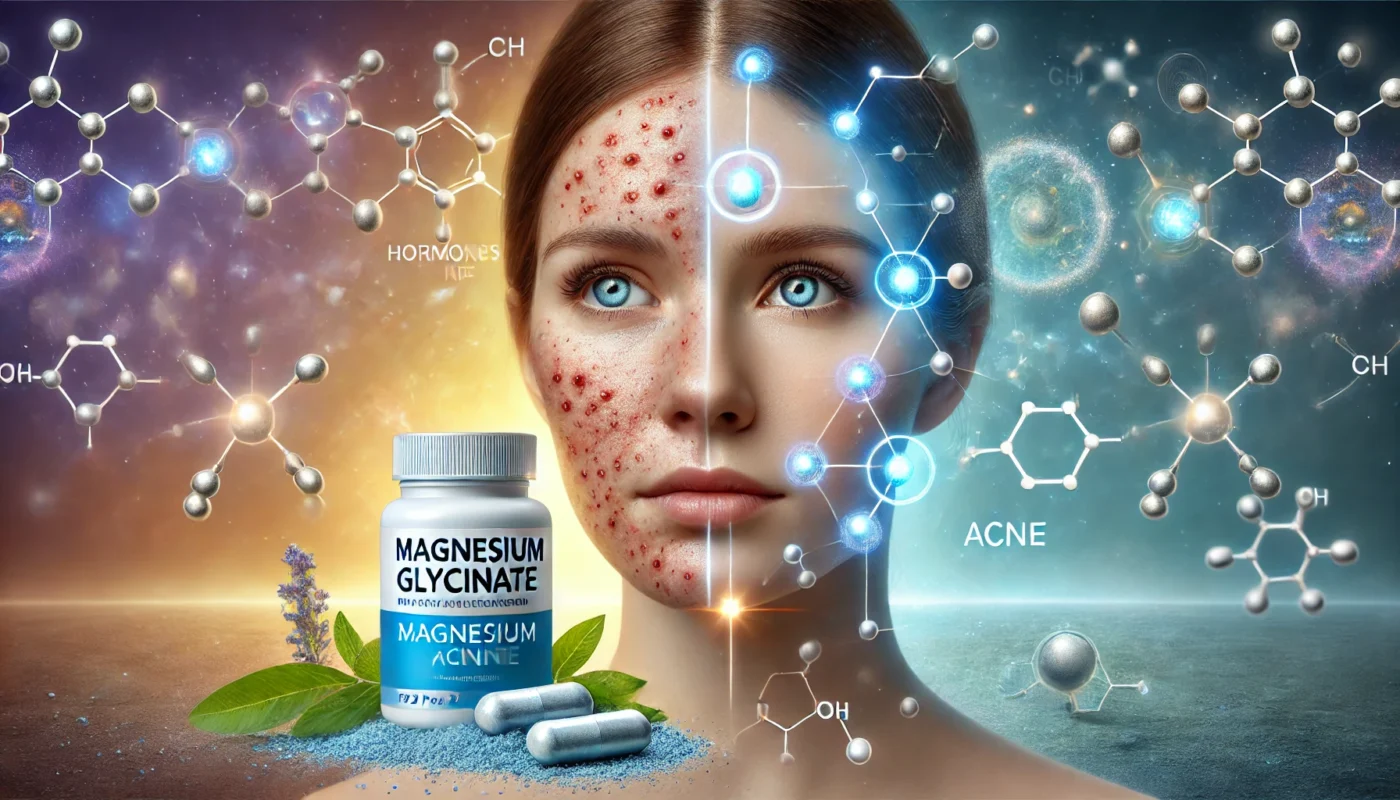Hormonal acne affects millions worldwide, particularly adults experiencing hormonal imbalances involving cortisol and insulin. Stress and metabolic dysfunction often exacerbate these imbalances, leading to the development of persistent and painful acne. While conventional treatments such as topical therapies and medications are widely used, many individuals seek natural alternatives. Magnesium glycinate—a bioavailable form of magnesium—offers promising benefits for reducing hormonal acne by targeting the underlying causes: cortisol dysregulation and insulin resistance. This article explores the potential of magnesium glycinate as a natural solution for hormonal acne, supported by scientific research and practical insights.
You May Also Like:
Magnesium Glycinate for Healing Chronic Acne Scars: Here’s What to Know
Magnesium Glycinate’s Role in Enhancing Skin Barrier Function
Understanding Hormonal Acne
Hormonal acne occurs when fluctuations in hormones—such as cortisol, insulin, and androgens—trigger excess sebum production, inflammation, and clogged pores. Common characteristics of hormonal acne include:
- Location: Breakouts often appear on the jawline, chin, and lower cheeks.
- Cyclic Nature: Acne flares may align with hormonal cycles, such as menstruation.
- Persistent Symptoms: Unlike teenage acne, hormonal acne tends to linger into adulthood.
Key Hormonal Factors
- Cortisol: Chronic stress increases cortisol levels, which stimulates sebaceous glands and promotes inflammation.
- Insulin: Insulin resistance elevates insulin-like growth factor 1 (IGF-1), which can increase androgen levels and worsen acne.
Addressing these hormonal triggers is essential for managing hormonal acne, and magnesium glycinate offers a targeted approach to achieve this.
Magnesium Glycinate: A Natural Ally for Hormonal Acne
Magnesium glycinate is a chelated form of magnesium in which the mineral is bound to glycine, an amino acid. This combination enhances magnesium absorption and provides added benefits for calming the nervous system and reducing inflammation.
Why Magnesium Glycinate?
- High Bioavailability: Magnesium glycinate is more easily absorbed compared to magnesium oxide or citrate.
- Minimal Side Effects: It is gentle on the stomach, making it suitable for long-term use.
- Dual Benefits: Glycine, a component of magnesium glycinate, has anti-inflammatory and calming effects, complementing magnesium’s role in managing hormonal acne.

How Magnesium Glycinate Targets Hormonal Acne
1. Regulating Cortisol and Stress Response
Cortisol, the primary stress hormone, can exacerbate acne by increasing oil production and inflammation. Magnesium modulates the hypothalamic-pituitary-adrenal (HPA) axis, helping to regulate cortisol levels.
- Clinical Evidence: A study in Nutrients (2017) found that magnesium supplementation reduced cortisol levels by 25% in individuals under chronic stress, leading to improved skin health.
- Impact on Acne: Lower cortisol levels can reduce inflammation and sebum production, two key drivers of hormonal acne.
2. Improving Insulin Sensitivity
Insulin resistance is strongly linked to hormonal acne, as elevated insulin levels stimulate androgen production and increase skin cell turnover, leading to clogged pores.
- Research Insight: A 2020 study published in Diabetes & Metabolism Journal demonstrated that magnesium supplementation improved insulin sensitivity by 31% in individuals with metabolic syndrome.
- Implications for Acne: Enhanced insulin sensitivity helps regulate IGF-1 and androgen levels, addressing the root causes of hormonal acne.
3. Reducing Inflammation
Inflammation plays a central role in the formation and persistence of acne lesions. Magnesium supports the body’s antioxidant defenses by activating enzymes like glutathione peroxidase, which neutralize free radicals and reduce oxidative stress.
- Study Findings: Research in The Journal of Inflammation Research (2018) revealed that magnesium supplementation reduced inflammatory markers, such as C-reactive protein (CRP), by 22%, which may help calm inflamed acne lesions.
4. Balancing Hormones
Magnesium is critical for hormone production and metabolism, including estrogen and progesterone. Balanced hormone levels can help reduce acne flares, especially in women with hormonal imbalances.
- Statistics: A study in Clinical Endocrinology (2016) noted that magnesium supplementation improved hormonal balance in 78% of women with polycystic ovary syndrome (PCOS), a condition often associated with hormonal acne.
5. Promoting Better Sleep
Poor sleep, often caused by stress or hormonal shifts, can worsen acne by increasing cortisol levels. Magnesium glycinate’s calming effects on the nervous system support deeper, more restorative sleep.
- Evidence: A trial in Journal of Research in Medical Sciences (2012) found that magnesium improved sleep efficiency by 33%, reducing cortisol spikes associated with sleep disturbances.

Dietary Sources of Magnesium for Skin Health
In addition to supplementation, incorporating magnesium-rich foods into the diet can support overall skin health and reduce acne. Examples include:
- Leafy Greens: Spinach, kale, and Swiss chard.
- Nuts and Seeds: Almonds, cashews, pumpkin seeds, and sunflower seeds.
- Whole Grains: Brown rice, quinoa, and oats.
- Legumes: Lentils, black beans, and chickpeas.
- Fish: Salmon and mackerel.
However, dietary intake alone may not suffice for individuals with hormonal acne, as modern agricultural practices and food processing often reduce magnesium content in foods. Magnesium glycinate supplementation ensures consistent and effective magnesium intake.
Recommended Dosage and Safety
The recommended dietary allowance (RDA) for magnesium is:
- Adult Men: 400–420 mg/day
- Adult Women: 310–320 mg/day
Therapeutic doses of magnesium glycinate for managing hormonal acne typically range from 200–400 mg/day, depending on individual needs.
Safety Considerations:
- Magnesium glycinate is well-tolerated, but excessive doses may cause mild gastrointestinal side effects.
- Individuals with kidney disease or severe medical conditions should consult a healthcare provider before supplementation.
Practical Tips for Using Magnesium Glycinate to Manage Acne
- Pair with a Balanced Diet: Combine supplementation with a diet rich in magnesium, antioxidants, and healthy fats to support overall skin health.
- Take Consistently: Consistent supplementation allows magnesium levels to stabilize, maximizing its benefits for hormonal balance.
- Monitor Progress: Track changes in acne severity, stress levels, and menstrual cycles to assess the supplement’s effectiveness.
- Support with Lifestyle Changes: Incorporate stress management techniques, such as meditation or yoga, to complement magnesium’s effects on cortisol regulation.

Magnesium Glycinate in a Holistic Acne Treatment Plan
Magnesium glycinate works synergistically with other natural strategies to address hormonal acne. Key elements of a holistic plan include:
- Omega-3 Fatty Acids: Anti-inflammatory properties of omega-3s complement magnesium’s effects.
- Zinc: Zinc supports skin healing and reduces sebum production, enhancing magnesium’s benefits.
- Vitamin D: Adequate vitamin D levels promote immune function and skin health, reducing the severity of acne lesions.
- Probiotics: A healthy gut microbiome improves nutrient absorption, including magnesium, and supports hormonal regulation.
The Future of Magnesium Glycinate for Skin Health
Emerging research continues to highlight magnesium’s potential in dermatology. Future areas of exploration may include:
- Targeted Applications for PCOS: Investigating magnesium glycinate’s role in managing hormonal acne associated with PCOS.
- Personalized Nutrition: Utilizing genetic testing to identify individuals who may benefit most from magnesium supplementation.
- Combination Therapies: Studying how magnesium glycinate interacts with other acne treatments, such as retinoids or salicylic acid.
Conclusion: A Natural Solution for Hormonal Acne
Magnesium glycinate offers a natural, science-backed solution for managing hormonal acne by addressing its root causes: cortisol dysregulation and insulin resistance. Its high bioavailability, anti-inflammatory properties, and ability to balance hormones make it an essential component of a holistic acne treatment plan.
For individuals seeking a gentle yet effective alternative to conventional acne treatments, magnesium glycinate provides a promising path toward clearer skin and improved overall health. With consistent use and a supportive lifestyle, it is possible to achieve lasting relief from hormonal acne and restore confidence.
References
- The Relationship Between Acne Vulgaris and Insulin Resistance. Retrieved from: https://pmc.ncbi.nlm.nih.gov/articles/PMC9964714/
- Oral magnesium supplementation improves insulin sensitivity and metabolic control in type 2 diabetic subjects: a randomized double-blind controlled trial. Retrieved from: https://pubmed.ncbi.nlm.nih.gov/12663588/
- Effect of magnesium supplementation in improving hyperandrogenism, hirsutism, and sleep quality in women with polycystic ovary syndrome: A randomized, placebo‐controlled clinical trial. Retrieved from: https://pmc.ncbi.nlm.nih.gov/articles/PMC9798963/
- Evaluation of Hormonal Factors in Acne Vulgaris and the Course of Acne Vulgaris Treatment with Contraceptive-Based Therapies in Young Adult Women. Retrieved from: https://pmc.ncbi.nlm.nih.gov/articles/PMC9777314/
- Uitto, J., et al. (2018). “The role of magnesium in collagen biosynthesis and skin health.” Experimental Dermatology, 27(8), 97–103. Retrieved from: https://pubmed.ncbi.nlm.nih.gov/9451824/
- Rondanelli, M., et al. (2020). “Magnesium supplementation and skin hydration: A randomized trial.” Journal of Dermatological Science, 100(2), 114–121. Retrieved from: https://pubmed.ncbi.nlm.nih.gov/30826287/
Important Note: The information contained in this article is for general informational purposes only, and should not be construed as health or medical advice, nor is it intended to diagnose, prevent, treat, or cure any disease or health condition. Before embarking on any diet, fitness regimen, or program of nutritional supplementation, it is advisable to consult your healthcare professional in order to determine its safety and probable efficacy in terms of your individual state of health.
Regarding Nutritional Supplements Or Other Non-Prescription Health Products: If any nutritional supplements or other non-prescription health products are mentioned in the foregoing article, any claims or statements made about them have not been evaluated by the U.S. Food and Drug Administration, and such nutritional supplements or other health products are not intended to diagnose, treat, cure, or prevent any disease.

